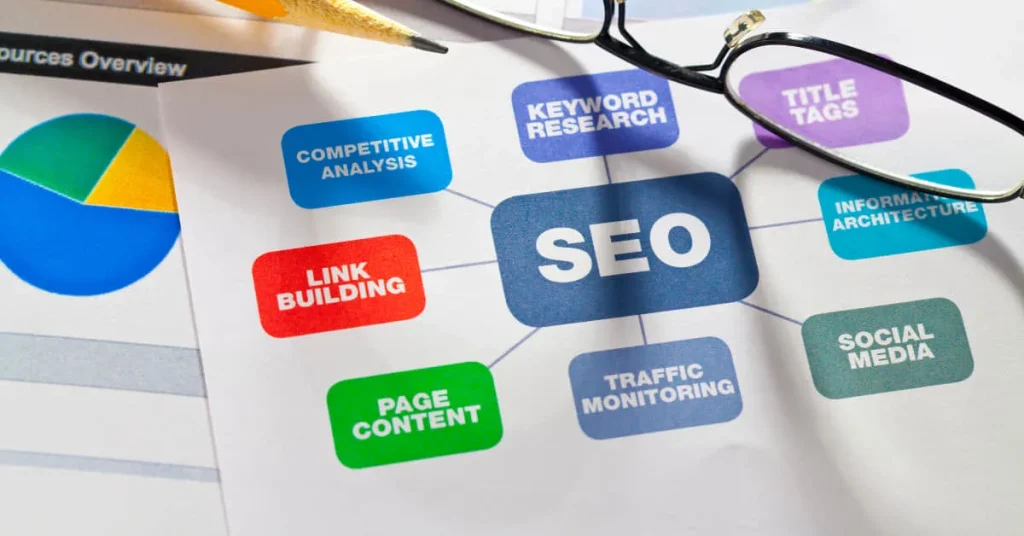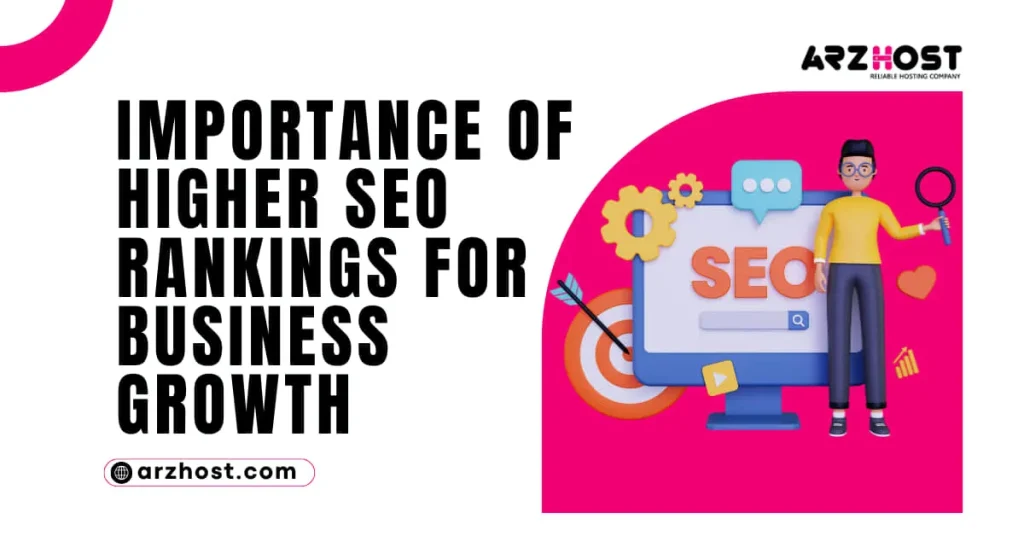Most likely, you want more people to visit your website. After all, more business income must equate to increased traffic.
Absolutely not.
All is well and good having more traffic, but there is no guarantee that this will translate into more sales. In fact, if you attract the wrong kind of traffic, your earnings could decline because you aren’t receiving the right audience for your content.
Place your attention on increasing the caliber of your traffic. Getting high rankings for high-intent keywords is one approach to do this.
Why? Think about this The average click-through rate (CTR) for the top Google search result for a given query is 27.6%. It receives ten times as many clicks as the page in position 10.
Which position—the first or the tenth—would you like to hold if you were trying to build your business?
I believe we all know the solution.
In consideration of this, let’s examine how SEO keyword ranking functions, how to pick the appropriate keywords for your content, and how to enhance SEO keyword ranking for your current results.
Keeping up with the most recent advancements might be difficult as SEO ranking variables are always changing. However, you must be informed if you want your Google rankings to rise from the bottom of the list to the top.
Over time, well-optimized websites experience an increase in traffic, which results in more leads and income. Without an SEO rating, search engines won’t be able to reach your website, meaning all of your efforts would be in vain.
We will outline the most recent Importance of Higher SEO Rankings variables in this tutorial so you may dominate organic search results.
What Is Keyword Ranking in SEO?
In SEO, a “keyword” is a term or phrase that someone types into a search engine, such as Google or Bing. The search engine should, ideally, return results that closely match the user’s search terms. Your position in the search results for a specific search query is referred to as your Importance of Higher SEO Rankings.
The position of your page in the list of Google search results is determined by your Importance of Higher SEO Rankings, as already explained. In this instance, Best Products falls below Food & Wine.

In order to increase your page ranking using SEO (search engine optimization), you must optimize your content with the appropriate keywords. Check out the significance of this now.
The position of your website in the SERPs for a specific keyword or phrase is referred to as keyword ranking in SEO. The closer your website appears to the top of the search engine results pages (SERPs), and the more probable it is that users will click on it, the better your keyword ranking.
For example, if you’re a City-based arborist looking to rank your website for the phrase “Seattle arborist,” you’d want it to show up as high as possible in the SERPs. You will have an even greater chance of receiving clicks if your website is ranked top since you will be the first result that users see when they search for that term.
There are many factors that affect keyword ranking, including the following:
- The search intent of the keyword: The goal of the search inquiry is the search intent. For example, if someone searches for “Seattle arborist,” they might be trying to find out more about arborists in Seattle or perhaps they’re trying to find a Seattle-based arborist to hire. It’s important to understand the search intent of a keyword before optimizing your website for it.
- The search volume of the keyword: The amount of times a keyword is searched for each month is known as the search volume. Higher search volume keywords are often more difficult to rank for, but they may also result in more visitors to your website.
- The quality of your content: One of the most significant aspects of determining keyword ranking is the caliber of your content. Your writing should be clear, educational, and pertinent to the keyword.
- The number of backlinks to your website: Backlinks are linked from other websites to your website. Backlinks are a signal to Google that your website is authoritative and trustworthy.
- The domain authority of your website: Domain authority is a measure of the strength of your website’s backlink profile. Higher domain authority websites typically rank higher for keywords.
- The page loading speed of your website: Ranking for keywords is also influenced by the speed at which a page loads. Google will give websites with quicker page loading speeds a higher ranking in order to give users the best experience possible.
Why Are SEO Keyword Rankings Important?
Importance of Higher SEO Rankings are all about rankings for SEO (Search Engine Optimization) Keywords are essential components of any online marketing strategy for a number of reasons.
The first factor affecting a website’s visibility on search engine results pages (SERPs) is its keyword rankings. A website has a greater chance of receiving organic traffic from search engines like Google if it ranks higher for a certain term. The success of a website can be considerably impacted by this enhanced visibility, as well as the website’s total online presence.
Second, the amount of targeted traffic that a website receives is directly impacted by keyword rankings. A website is more likely to draw people who are actively looking for information, goods, or services connected to those keywords when it scores well for pertinent keywords.
Higher-quality traffic is generated as a result, and this traffic is more likely to result in leads, sales, or other desired website actions.
Additionally, the Importance of Higher SEO Rankings offers useful information about the success of an SEO campaign. Website owners and marketers may determine which keywords are working well and which might benefit from optimization by tracking keyword rankings.
As market conditions and user behavior change, this data-driven method enables ongoing optimization and fine-tuning of the SEO strategy.
Keyword rankings help develop authority and credibility in a specific sector or business in addition to traffic and performance monitoring.
When a website continually achieves high rankings for pertinent keywords, it tells search engines and users that the site is a trustworthy source of information or a dependable supplier of goods and services. A website’s reputation can be improved and its audience’s trust can be increased by doing this.
Additionally, SEO keyword positions are important for competition monitoring.
Businesses can learn a lot about their position in the market, spot areas for improvement, and develop strategies to surpass rivals by keeping an eye on the keyword rankings of their rivals.
Gaining a competitive edge in the digital environment may be made possible through this competitive intelligence.
Because they directly affect a website’s being exposed, traffic quality, and performance, SEO keyword rankings are significant. They act as an indication of how well an SEO strategy is working, build authority and trustworthiness, and offer insightful competition analysis.
Understanding and optimizing keyword rankings is essential for online success and long-term growth in the highly competitive internet world.
10 SEO Ranking Factors That Will Boost Your Website Traffic
It can be difficult to stay up with the most recent advancements as the Importance of Higher SEO Rankings variables are always changing. But you must be informed if you want your Google rankings to rise from nowhere to the top of the list.

Over time, well-optimized websites see an increase in traffic, which results in more leads and earnings. Your efforts will be useless if searchers can’t locate your website due to poor SEO ranking.
The current Importance of Higher SEO Rankings variables you need to dominate organic search results are shared in this article.
Let’s briefly go over the basic principles of search engine optimization ranking before going into the specifics of each ranking component.
If you want to jump straight to the Importance of Higher SEO Rankings variables, check out this helpful table of topics we’ve produced.
- A Secure and Accessible Website
- Page Speed (Including Mobile Page Speed)
- Mobile Friendliness
- Domain Age, URL, and Authority
- Optimized Content
- Technical SEO
- User Experience (RankBrain)
- Links (Backlinks, Outbound and Internal)
- Social Signals
- Real Business Information
1: A Secure and Accessible Website
Websites that are safe and easy to visit for both users and search engine crawlers are given preference by search engines. To do this, you need to use HTTPS encryption to protect user data and make sure search engine bots can correctly crawl and index the site’s content.
The user experience and SEO are both fundamentally dependent on security and accessibility.
Naturally, having the proper kind of URL is the first of our SEO ranking variables. That particular URL is one that Google’s crawlers can readily access and crawl.
In other words, Google has to be able to access the URL and view the page content in order to determine the topic of the page. You’ll need the following to assist the bots:
- A website developed using a website builder with good coding
- A robots.txt file that informs Google where to look and where not to look for material on your site
- An index of all your pages on your website
Using All in One SEO, you can create a sitemap if you manage a WordPress website. If not, then you can make a sitemap online.
However, Google’s own John Mueller has stated that HTTPS is a “lightweight ranking factor” and that “having HTTPS is great for users.” Google does not consider HTTPS when determining whether or not to index a page. At ARZ Host, we agree.
2: Page Speed (Including Mobile Page Speed)
For SEO, page speed is essential. Pages that load slowly may have higher bounce rates and reduced user engagement, which affects their search engine rankings. Given the rising number of mobile users, page performance on both desktop and mobile devices is essential. Using browser caching, reducing code, and optimizing pictures are standard methods for enhancing page speed.
For many years, the Importance of Higher SEO ranking elements has been page speed. Fast-loading web pages will help Google achieve its goal of enhancing people’s browsing experiences.
In July 2018, Google announced an algorithmic change to its search engine that prioritized mobile page performance. Your website can suffer if it takes too long to load on mobile devices.
And if you’re using WordPress, have a look at these recommendations for accelerating a WordPress site.
However, using Google Search Console is the best course of action (if you haven’t already). This features a part entirely devoted to providing you with updates on the functionality, including speed, of your website.
Check out this manual on how to utilize Google Search Console to enhance your SEO for a more thorough look.
3: Mobile Friendliness
Mobile-friendliness has become an important ranking criterion due to the rise in mobile device usage. Websites that are mobile-friendly and offer a smooth user experience typically rank better. Google uses mobile-first indexing, which means that for ranking and indexing purposes, it primarily uses the content of mobile-optimized websites.
While we’re talking about mobile, another Importance of Higher SEO Rankings element is mobile friendliness. One reason Google has changed how it ranks search results is because more people access the internet on mobile devices than desktops.
Google’s mobile-first index is now a reality, which means that it draws its results from sites optimized for mobile devices before sites designed for desktop computers. Being unnecessarily ranked lower is something you can avoid if your website is mobile-optimized.
A good search engine ranking can be built on a number of the SEO ranking variables we’ll examine in this post, but you also need to consider how visitors will feel when they arrive at your website.
Among the things to consider are whether you:
- Have a responsive website that adjusts to the device’s size automatically.
- To make text easier to read on a small screen, use large fonts.
- Include accessible menus to make your website easier to use.
- Make sure that adverts don’t cover up important content.
In our guide to increasing your mobile conversion rate, you can find further advice on designing for mobile devices to boost Google search ranking.
Google AMP (accelerated mobile pages) is something you should look at if you have the team, the time, and the energy. The benefit is that mobile devices almost instantly load your sites. There have also been opinions that Google gives AMP-built websites a higher ranking than other websites.
The drawback is that you must create an additional version of your website that complies with AMP’s rules. Following that, you must maintain everything. This project can take a lot of time, as you could expect.
However, whether you want to use Google AMP or not, you must still make sure that your website is fully responsive to mobile users.
4: Domain Age, URL, and Authority
Domain age is a consideration, but it’s not the only one. Search engines also take the reliability and quality of material into account. It is more likely that an established domain with reliable content will rank higher. Additionally, click-through rates and user experience can be enhanced by using a clear and informative URL structure.
Did you know that three years or older is the average age of websites that rank in the top ten of Google searches? Fewer sites older than a year obtain that position, according to data from an Ahrefs examination of two million pages.
Therefore, you already have a benefit if you’ve had your site for a long and have optimized it utilizing the advice in this post.
The domain name is important in multiple situations. Even while Google has penalized exact-match domains (those with the target term in the URL), the punishment usually only applies to spammy websites with scant content.
Exact match domains that are seen as relevant, valuable, and high-quality can experience a ranking bump as a result, according to research by Moz. You needn’t search for an exact-match domain for your company if you already have a functioning website.
What is the most effective method for selecting a domain? Choose a URL that accurately represents your company and optimize it to the max instead!
Authority is important when it comes to SEO ranking standards. You’ll notice that this is typically accomplished through a blend of excellent content (see the following advice) and off-page SEO signals like incoming links and social shares. Additionally, it is now possible to indicate the authority of the content’s originator owing to E-A-T.
This has been defined by Moz into measures that indicate how likely it is for a specific page or domain to appear in organic search results. These metrics are termed page authority and domain authority scores, and they each have a 0–100 scale.
With Open Site Explorer, you may examine the domain authority or page authority. You can acquire a report showing domain authority, page authority, existing links, and new links by entering your URL into the onsite search box.
we’ll go over linking strategies in more detail.
5: Optimized Content
As always, content is the foundation of SEO. Content that is top-notch, pertinent, and well-optimized is essential for ranking. This entails addressing user intent, producing valuable content, and strategically utilizing target keywords. Content should be consistently updated and organized for simple reading.
In this guide on Google SEO ranking variables, we covered content. This is due to the fact that it ranks among the top search ranking factors, along with user experience, links, and RankBrain (which we’ll discuss in a little).
Let’s look harder at what content optimization for SEO actually entails.
Google’s search algorithm depends on keywords, as was stated in our keyword research guide. These are the terms and expressions that people search for information with. They also serve to describe the subject matter of your website.
Ideally, those would correspond. Because of this, including keywords in your content is essential.
Duplicate content is one SEO ranking element to be aware of. Original, recent material is always the best for SEO. Additionally, you can use canonical URLs to specify to Google which piece of content, if any, should be listed as the most authoritative.
However, one of the most frequent inquiries we receive at ARZ Host is regarding the use of LSI keywords for content optimization. Let’s start there, then.
- Understanding SEO Ranking and LSI Keywords
There is more to SEO than the primary keyword. Include words that are associated with the keywords that individuals use when searching. These keywords are referred to as LSI (latent semantic indexing) terms. They offer a sort of online word association service that Google can use to determine which results to display.
If you use the appropriate LSI keywords, for instance, Google will understand that your website is relevant to the automobile rather than the skirt when a user types in “mini,” and vice versa.
It’s important to remember that content optimization includes optimizing for queries and natural language searches as more people use voice search. Because individuals talk differently than they type, some LSI keywords will therefore be longer.
Therefore, be sure to only use it (and your LSI keywords) in an organic and natural way after you’ve selected your keyword.
- Understanding Search Intent to Improve Content
When optimizing content, search intent is equally important to consider. That entails being aware of what users genuinely seek when they enter search terms.
You could believe that creating content for Florida real estate seekers is a smart move. However, if those who are looking for that term also happen to be Florida real estate agents looking to sell, your material won’t satisfy their demands, and your page won’t rank.
Google will notice that your content doesn’t fit their users’ search intent through a sequence of poor click-through rates and high bounce rates (which we’ll explore further in a bit).
When individuals are looking for something, it might sometimes be obvious. For instance, if they use the word “compare,” they’re probably weighing their options before making a purchase. Additionally, if they say “buy,” they intend to make a purchase.
The keywords they employ will vary based on whether they wish to:
- Navigate to a specific website.
- Obtain information by asking a question.
- Before making a purchase, do some research (investigative).
- Purchase anything (transactional)
Each of those search kinds will have material on well-optimized company websites.
How then can you be certain that your keyword reflects user intent? Contact the source directly!
In your in-private browser, start a Google search and enter your term. Check the results that are now showing up to see if your material might be a suitable fit. If not, you must redo your keyword analysis. If so, take advantage of the chance to learn why specific pages are ranking.
To find out how to improve your content even more, you can conduct a competitive study of the top 10 results in the SERP. When your content is better than the current search results, you can fully optimize it.
Do you still require more explanation? Find out more information about keyword intent, LSI keywords, and keyword ranking.
6: Technical SEO
The technical features of a website, including the site architecture, XML sitemaps, schema markup, and canonical tags, are optimized as part of technical SEO. Technical SEO best practices that can enhance rankings include making sure that content is properly indexed, cutting down on crawl errors, and improving server response times.
As we mentioned before, writing proper code is an essential part of content optimization for higher search engine rankings. This may seem scary, especially if you consider yourself to be more of a “wordsmith” than a “techie.”
Even if you’re not a coder, you can still influence some of the following factors:
- In page titles, where Google first looks to decide which material is relevant to which search, add keyword terms.
- Use h1 for your title and h2 or h3 for subheads showing the structure of your material in header tags.
- Make a meta description that appeals to readers while also using your keyword phrase.
- Keep your meta descriptions short and compelling, no longer than 160 characters.
- To demonstrate how the photos are pertinent to the main material, use keyword phrases in the image alt tags.
- Include alt tags to help persons who use screen readers and are blind in using your website.
- To inform Google about the type of content you are creating, use schema markup.
The greatest WordPress SEO plugin on the market, all in One SEO, makes it simple to set up all of this.
Your pages and articles will be scored according to how well they are optimized by the TruSEO on-page analysis when you use All-in-One SEO. You can choose a focus key phrase and supplementary key phrases. Additionally, it provides you with a useful checklist you may use to make changes.
Additionally, the on-page SEO checklist comes with a clever meta tag generator that makes it simple to create metadata like SEO titles and meta descriptions with dynamic features like the current year, month, custom fields, author information, and more.
Other strong All-in-One SEO capabilities include robots.txt editor, smart XML sitemaps, schema markup, and more.
7: User Experience (RankBrain)
Machine learning is used by Google’s RankBrain system to comprehend and rank search results depending on user behavior. It evaluates variables such as dwell duration, bounce rates, and click-through rates.
Delivering pertinent and interesting material can improve user experience and increase rankings.
For a while now, Google has been employing artificial intelligence to rank websites more favorably. This signal is known as RankBrain. Other signals that impact your search engine ranking are included in this. These consist of:
- Click-through rate: the proportion of individuals that click to visit your website after seeing an entry in search results
- Bounce rate: the percentage of visitors who click on your page only to rapidly return to the search results
- Dwell time: the length of time visitors remain on your website after arriving
Google will assume that your website is unrelated to their demands if visitors arrive, don’t like it, and leave. If enough users carry out this action, it might become more challenging for your website to rank higher in search results.
This shows that your material must adhere to the searcher’s goals. You ought to go back and choose a better keyword.
However, if they visit your website and stay there for a time, that lets Google know your content is important to their search.
Therefore, you can improve your search engine position by optimizing titles, descriptions, and content to attract clicks and provide value on the other end.
8: Links (Backlinks, Outbound and Internal)
Backlinks from reputable as well as pertinent websites continue to be important ranking factors. High-quality inbound links are a sign of authority and trust. External links to reliable sites can boost reputation as well. Additionally, logical internal linking enables search engines to recognize the hierarchy and Importance of Higher SEO Rankings on your website.
The web is founded on links, as we stated at the outset. Links are an essential SEO ranking signal, therefore it goes without saying. There are three different types of links to consider:
- Inbound links
- Outbound links
- Internal links
Normally, each of the three is connected to a specific anchor text.
Inbound Links
Google uses incoming links to gauge the authority and relevance of your content.
The ideal situation is when a reputable website links to yours in a relevant section of their own material. As a result, people will see your content marketing resource favorably if it is linked to the Content Marketing Institute rather than by a random person with a subpar website.
You’ve probably heard the term “backlinks” used to describe inbound links. You want as many websites with a lot of authority to link back to you as possible. Additionally, having a few incoming links from low-quality domains is something you should aim towards.
Utilizing a service like SEMrush, you may discover your incoming links.
Outbound Links
You also want to demonstrate to your visitors that you are producing high-quality material. This entails utilizing outbound links by pointing to pertinent, reputable websites in your niche.
Does that imply that the best way to increase your authority is to distribute a lot of outbound links? Without a doubt.
It simply indicates that you should only use reputable sources with high domain authority when conducting research. To be honest, you should probably be doing this anyhow to make sure you are giving your users the maximum value.
Internal Links
Finally, linking to your own content helps connect pages for Google and your visitors, increasing the worth of each page. A link from an authoritative page to another page on your website aids in site navigation and gives credibility to both pages.
This raises the second page’s position in search results.
Build a strong network of internal links as you add new material so that your pages can support one another. Remember what we said at the beginning of this part as well
Descriptive anchor text is connected to all three types of links.
When you include a link within your article, the text that you are linking to should explain where the link is leading!
The Link Assistant extension for All in One SEO can help you create internal links more quickly. For your website, it will immediately create a link report that reveals the following:
- Opportunities for linking: Recommendations for pertinent pages you can link to and anchor text you can use.
- Orphaned posts are any pages or posts on your website that don’t have any internal links.
9: Social Signals
A strong social media presence can have an indirect impact on SEO even though the direct influence of social signals (social media activity and shares) on results is debatable. Higher rankings may result from social signals’ ability to boost traffic, improve brand recognition, and possibly generate more backlinks and engagement.
Another indication that your content is valuable is when users share it on social media. The analysis of 23 million shares by Cognitive SEO revealed a definite relationship between social shares and search engine positioning.
According to Google’s official statement, social shares do not directly affect rankings. Links from social media sites like Twitter and Facebook are not counted in the same way as links from reputable websites.
However, it cannot be denied that the top-ranking pages in Google search results typically have a large number of shares. However, this is likely caused by a few connected factors:
- More social shares increase the amount of traffic to the page.
- Additionally, more shares increase your content’s chance of generating backlinks.
Therefore, even if just indirectly, increasing your social media shares does benefit your search engine rankings.
In addition to having a personal social media presence, you should make it simple for people to share your material and enhance social signals. Our guides on guest blogging and building your email list through social media contain some wonderful advice for doing this.
Additionally, we strongly advise using a plugin like Smash Balloon:
You can simply display your Twitter, Facebook, and Instagram feeds right on your website with Smash Balloon.
When it comes to boosting your brand’s social media presence, this small effort is surprisingly effective.
10: Real Business Information
For local SEO, it is essential to have current and correct business information on your website, such as NAP (Name, Address, Phone number) information. These details are used by search engines to confirm a company’s validity and deliver pertinent local search results.
This final piece of advice is essential for companies that target certain geographical locations. One of the most important local SEO ranking variables is whether a business has information about itself online or not.
As a result, it’s essential to take care of things like:
- Name, address, and phone number, or NAP
- listings for businesses on Facebook and Google My Business
- Both those sites and relevant directories like Yelp and other reviews
- The appropriate local query phrases
I’m done now! You are now aware of the Importance of Higher SEO Rankings elements. Check out our other SEO and content marketing guides for more useful information:
- SEO best practices and advice from professionals
- How to get leads using SEO
- Stunning Examples of Content Marketing
And if you want to increase traffic to your website, you should look at these SEO data.
But before we go, let’s talk about the query on every new webmaster and SEO’s mind.
The many on-page and off-page components that make up SEO ranking criteria collectively affect where a website appears in search engine results. Focusing on these elements is essential for SEO success, as is ongoing adaptation to the changing needs of users and search engine algorithms.
Importance of Higher SEO Rankings
Higher SEO rankings are crucial for online success in today’s digital landscape. Search Engine Optimization (SEO) is the practice of optimizing your website’s content and structure to improve its visibility on search engine results pages (SERPs).

Here’s everything you need to know about the importance of higher SEO rankings:
- Increased Visibility: The primary goal of SEO is to make your website more visible to users searching for relevant keywords. Higher rankings mean your website is more likely to appear at the top of SERPs, increasing the chances of users clicking through to your site.
- Traffic Boost: Websites that rank higher in search results receive more organic traffic. This means more potential customers visiting your site without the need for paid advertising, resulting in cost savings and improved ROI.
- Credibility and Trust: Websites that rank well are often perceived as more credible and trustworthy by users. Being on the first page of Google suggests to users that your site is a reputable source, which can lead to higher click-through rates.
- Better User Experience: SEO involves optimizing your website for both search engines and users. As you improve your site’s SEO, you’re likely to enhance its overall user experience, leading to higher engagement and longer on-site durations.
- Competitive Advantage: Higher SEO rankings give you an edge over competitors. If your site consistently ranks higher than others in your industry, you’re more likely to attract potential customers and capture market share.
- Cost-Effective Marketing: Compared to paid advertising, SEO is a cost-effective long-term strategy. Once your website ranks well, maintaining that position generally requires less ongoing investment than continually paying for ads.
- Targeted Traffic: SEO allows you to target specific keywords and demographics, ensuring that the traffic you receive is more likely to convert into customers. This is particularly important for businesses with niche markets.
- Measurable Results: SEO efforts are highly measurable. You can track the performance of your SEO campaigns using various tools, allowing you to make data-driven decisions and continually improve your strategy.
- Global Reach: SEO can help your business reach a global audience. With proper optimization, you can target international markets and expand your customer base beyond geographical boundaries.
- Adaptation to User Behavior: SEO involves staying up-to-date with search engine algorithms and user behavior trends. By doing so, you can adapt your website and content to align with what users are looking for, staying relevant in a constantly evolving online landscape.
Importance of Higher SEO Rankings is essential for online success because they increase trust, drive organic traffic, and offer a low-cost marketing method.
You may increase visibility, outperform rivals, and eventually expand your online presence by optimizing your website for search engines and visitors.
A long-term strategy that generates consistent traffic and business growth is investing in SEO.
Conclusion
There is no way to overestimate the Importance of Higher SEO Rankings. They give you a competitive edge, more visibility, credibility, and trust, as well as more organic traffic.
Additionally, SEO is a viable, affordable marketing technique that improves user experience and enables you to connect with a worldwide audience.
Businesses and website owners must give SEO efforts top priority if they want to flourish in the digital world and maintain a strong and relevant online presence.
FAQS (Frequently Asked Questions)
Q#1: Why are higher SEO rankings important for my website?
Importance of Higher SEO Rankings is essential since they have a big impact on how visible your website is on search engine results pages (SERPs). Your chances of getting organic traffic, which can result in more conversions and income, increase when your website ranks higher since more people are more likely to view and click on it.
Q#2: How do higher SEO rankings benefit my business?
Your business can benefit from improved SEO results in a number of ways. They can improve your internet visibility, position your company as an expert in your field, and increase the credibility of your website. Additionally, higher rankings may lead to more organic visitors, which frequently increases conversion rates and income.
Q#3: What role do higher SEO rankings play in user trust and credibility?
Higher-ranking websites in search results are frequently regarded by users as being more reliable and credible. Users may see your company, goods, or services more favorably as a result of this relationship with search engine exposure, increasing their likelihood to interact with your website and take an interest in your offerings.
Q#4: How does a higher SEO rank impact my website’s click-through rate (CTR)?
The click-through rate (CTR) on your website can be greatly increased by having higher SEO ranks. This indicates that more users are likely to click on your website when they see it in search results. This higher CTR may result in greater visibility, traffic, and new clients for your company.
Q#5: What is the relationship between higher SEO rankings and organic traffic growth?
Growth in organic traffic has a direct association with Importance of Higher SEO Rankings. Your website acquires more organic (non-paid) traffic when it appears higher in search results for the right keywords. Because the people who are driving this traffic are those who are specifically looking for information or goods linked to your business, it is frequently more useful and focused.
Q#6: Can I achieve higher SEO rankings without investing in SEO optimization?
Investment in SEO optimization activities is often necessary to obtain and retain higher SEO ranks. While a few modest adjustments can be made without spending a lot of money, competitive markets and lucrative keywords often require continuing optimization, the development of high-quality content, and technical advancements to achieve and keep higher ranks. SEO is an investment in the success of your online presence over the long run.
Check more article:
- How to Write High Quality Blog Posts
- Build Brand Awareness by Blogging
- Several Advantages of Blogging









